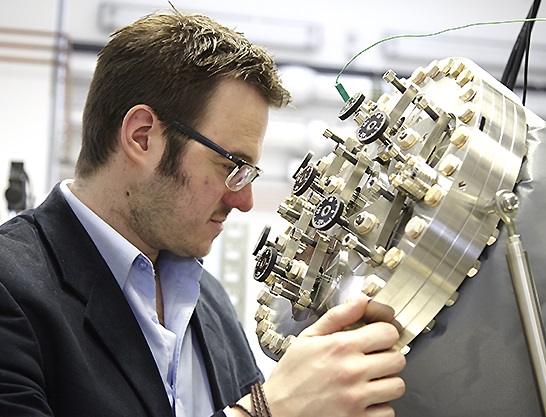See our tips for applicants to this scheme
About the scheme
The University Research Fellowship (URF) programme aims to support the next generation of research leaders to undertake cutting-edge research. The objectives of the URF programme are to enable outstanding early career scientists with the potential to become leaders in their field to:
- Build an independent research career at a UK university or research institution
- Gain the freedom, time, and long-term flexible support to pursue high-quality and innovative lines of scientific research
- Develop as research leaders by offering tailored high-quality professional development, networking and engagement opportunities.
Fellowships are for eight years, with years six to eight being subject to satisfactory progress demonstrated in a mid-fellowship review at year four.
The Royal Society recognises that diversity is essential for delivering excellence in science, technology, engineering and mathematics (STEM), and wants to encourage applications from the widest range of backgrounds, perspectives and experiences to maximise innovation and creativity in science for the benefit of humanity. We regularly review and revise policies and processes to embed equity, diversity and inclusion (EDI) principles in all aspects of the grant making process and ensure all talented applicants have an equitable chance to succeed as per the assessment criteria.
See below for details of adjustments we can provide for disabled applicants.
Changes to the scheme
As part of the Royal Society’s wider changes to our costing policy, applicants are now permitted to apply for a maximum award value over eight years (£1.83 million for the 2024 round). Maximum caps for salary contribution and research costs have been removed and going forward there will be a total maximum grant value for applicants to work with.
We recommend reading the information in full and contacting your host organisation Research Office in the first instance with any questions.
What does the scheme offer?
Applicants can apply for up to a maximum of £1.83 million over eight years.
Funds can cover:
- Contribution to the award holder’s salary
- Indirect and estate costs
- Equipment costs and research expenses including consumables, travel, etc.
- Contribution towards research assistance salary and associated indirect and estate costs
- Support for a new four-year PhD studentship(s)
- Relocation and visa costs for the applicants and their dependants (partner and children). The total grant cap may be exceeded in order to cover relocation/visa costs if this is well justified in the application.
Full funding details can be found in the scheme notes and in the Royal Society Funding Guidance.
We provide flexibility to accommodate personal circumstances including part-time working, sabbaticals and secondments. There is provision for maternity, paternity, shared parental, adoptive or extended sick leave, as well as financial support for childcare costs that arise from attending conferences and research visits.
Royal Society Research Fellows also have the opportunity to access a range of career development and engagement opportunities including training on leadership, science communication and public engagement, and activities coordinated by our science policy and schools engagement teams. For further detail on these additional benefits, read our opportunities page.
Royal Society awards have made a significant impact on many researchers’ careers. Case studies from grant-holders can be found elsewhere on this page, or read an in-depth report on the careers of our alumni on our Career Pathway Tracker page.
This scheme is for you if:
- You have between three and eight years of research experience, excluding career breaks, since the award of your PhD by the closing date of the round; please refer to the scheme notes for further detail about the review of career breaks
- You do not hold a permanent post (including proleptic appointment) in a university or not-for-profit research organisation
- You do not hold, or have not previously held, an equivalent fellowship that provides an opportunity to establish an independent research group and therefore independent researcher status
- Your research is within the Royal Society’s remit of natural sciences, which includes but is not limited to biological research and biomedical sciences, chemistry, engineering, mathematics and physics. For a full list, please see the breakdown of subject groups and areas supported by the Royal Society.
Applicants can be of any nationality and those requiring a visa are eligible to apply for a Global Talent Visa under the fast-track process of endorsement.
Read the scheme notes or FAQs (PDF) for further information on eligibility. Those applying from Ireland (ROI) are funded by Science Foundation Ireland and will need to read the eligibility requirements in the SFI-specific scheme notes.
Please ensure that you meet all eligibility requirements before applying.
You will apply through our application and grant management system, Flexi-Grant®.
See the ‘Application and assessment process’ page for a general overview of the application and selection steps and below for details specific to this scheme.
Assessment of your application will be overseen by one of our five Research Appointment Panels (Standing Committees) based on your research area:
- Ai: Astronomy, cosmology, physics, earth sciences, environmental physical sciences & geosciences
- Aii: Chemistry and engineering
- Aiii: Pure and applied mathematics, computer science, statistics, communications and computer engineering; the mathematical aspects of astronomy, physics, cosmology, gravitation, theoretical physics
- Bi: Molecular and cellular biology, zoology, plant sciences and physiology
- Bii: Biomedical Sciences
Assessment of your application will be overseen by one of the five Research Appointment Panels. Following eligibility checks, applications are initially assessed by a minimum of two panel members who have the most appropriate scientific expertise. A longlist is drawn up, with longlisted applications subject to independent peer review. Following completion of independent peer review, a shortlist for interview is drawn up with oversight from the Panel Chairs. At the end of the interview stage, the Panels will confirm the recommendations for funding.
Further detail on the application and review process is available in the scheme notes.
The Royal Society welcomes applications from scientists with disabilities and provides adjustments to ensure that they can participate fully in the selection process. If you need an adjustment when accessing the application form, attending interviews, or for any other part of the application process, please contact the Grants team on urf@royalsociety.org or +44 20 7451 2666. Adjustments can include, but are not limited to:
- extension of the deadline
- additional support to complete the application form
- technical support during interviews for candidates with hearing or visual impairments
- support during interviews for neurodiverse candidates and those with mental health conditions
- additional costs to support those candidates requiring a chaperone during interviews
For the University Research Fellowship, shortlisted applicants will be invited to an in-person interview at the Royal Society.
The aim of the interview is for you to demonstrate the importance and scientific validity of your work and for you to also describe how the award will lead to your scientific independence.
If you have further questions regarding the scheme, please see the FAQs, contact the Grants team on urf@royalsociety.org or visit our contact us page.











